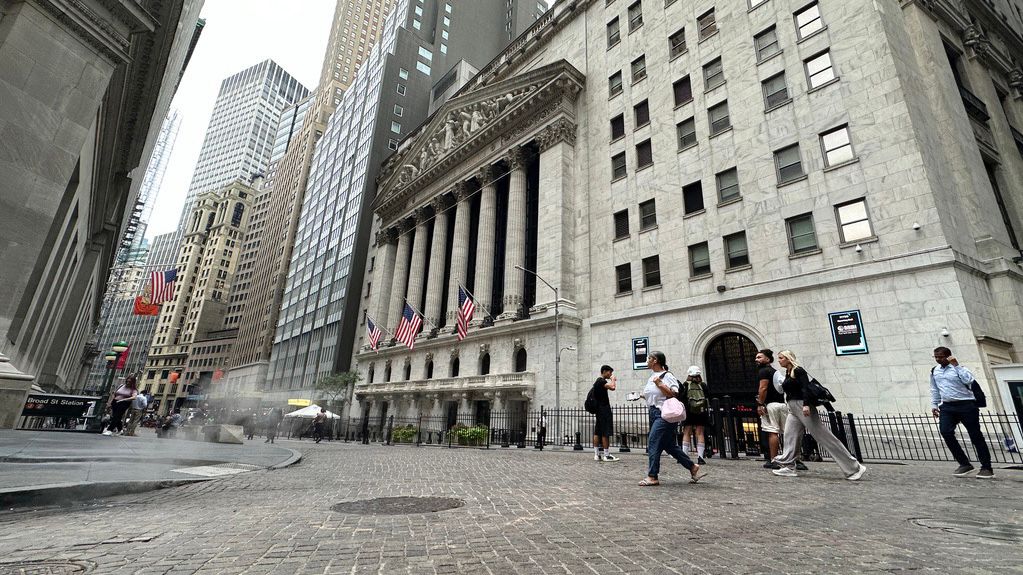Stocks continued to fall on Friday on concerns that the US economy may collapse due to the weight of higher interest rates aimed at reducing inflation.
The S&P 500 was down 2.5% in midday trading, possibly its worst intraday run since 2022, and on track for its first recent loss up 1% from April. The Dow Jones Industrial Average was down 954 points, or 2.4%, as of 11:30 a.m. Eastern time, and the Nasdaq composite was down 2.9% as stock sales took a beating around the world back to Wall Street.
A report showing US employment fell last month more than economists expected sent shockwaves through markets, with yields and bond yields falling sharply. It followed a set of weaker-than-expected economic reports from the day before, including a deterioration in US manufacturing, which has been one of the areas hardest hit by high prices.
It was a few days ago that US stock indexes reached their best day in months after Fed Chairman Jerome Powell gave a clear signal despite and that inflation has decreased enough for discounts to start in September.
Now, concerns are mounting, the Fed may keep interest rates at a two-decade high for a very long time. The rate cut would make it easier for US households and companies to borrow money and boost the economy, but it could take months to a year for the full effects to take effect.
“The Fed is taking victory from the jaws of victory,” said Brian Jacobsen, chief economist at Annex Wealth Management. “Economic conditions have declined so much that a rate cut in September will be too little and too late. They’re going to have to do a lot more” than the traditional one-quarter percent approach “to prevent a recession.”
Traders are now betting on a better than three-in-four chance that the Fed will cut its interest rate by half a percentage point in September, according to data from CME Group. That’s despite Powell saying Wednesday that such a deep cut “is not something we’re thinking about right now.”
US stocks already looked headed for losses before the disappointing jobs report hit Wall Street.
Several major technology companies reported weak earnings, continuing a disappointing run that began last week with results from Tesla and Alphabet.
Amazon fell 9.9% after reporting weaker-than-expected revenue for the latest quarter. The sales and technology specialist also issued an operating profit forecast for the summer that fell short of analysts’ expectations.
Intel fell further, 26.5%, after the chip company’s profit for the latest quarter fell sharply short of forecasts. It also suspended its dividend payout and said it expected to lose money in the third quarter, while analysts had expected a profit.
Apple was holding steady, up 2%, after reporting better-than-expected earnings and revenue.
Apple and a handful of other Big Tech stocks known as the “Magnificent Seven” have been the main reason the S&P 500 has set so many records this year, partly due to the boom in artificial intelligence technology. But their momentum changed last month with worried investors taking their prices too high and expectations of future growth too difficult to meet.
Friday’s losses for technology stocks sent the Nasdaq composite down more than 10% from its record high set in the middle of last month.
Helpfully for Wall Street, some areas of the stock market that have been depressed by high interest rates were increasing at the same time, technology products are falling, especially small companies. But they too fell on Friday on concerns that a weak economy could lower their profits.
The Russell 2000 index of small-cap stocks fell 4.2%, outpacing the rest of the market.
In the bond market, Treasury yields fell sharply as traders raised their expectations of how deeply the Federal Reserve will have to cut interest rates. The 10-year Treasury yield fell to 3.81% from 3.98% late Thursday and from 4.70% in April.
Amidst all the fear, some Wall Street voices were sounding a note of caution.
“While concerns about policy failure are growing, one bad mistake shouldn’t lead to too much,” according to Lara Castleton, US head of construction and strategy at Janus Henderson Investors.
He points out that the US economy is growing, and inflation is falling. The S&P 500, meanwhile, is not far from its record high set two weeks ago. “Funds selling should be considered a normal reaction, especially considering the high valuations in many pockets of the market. It is a good reminder to investors to focus on the earnings of companies going forward.”
In foreign stock markets, Japan’s Nikkei 225 fell 5.8%. It has been struggling since the Bank of Japan raised its interest rate on Wednesday. The hike boosted the value of the Japanese yen against the U.S. dollar, potentially eroding profits for exporters and dampening tourism growth.
Chinese stocks fell for the week as investors registered disappointment over the government’s recent efforts to boost growth through a series of small measures, rather than relying on broad-based stimulus, while the stock indexes fell by more than 1% across most of Europe.
Property prices have also struggled this week. Oil prices rose after the assassinations of Hamas and Hezbollah leaders raised fears that escalating conflicts in the Middle East could disrupt the flow of oil.
But prices fell on Thursday and Friday on concerns that a weak economy would burn less fuel. Benchmark US crude fell 3.7% on Friday to bring its loss for the week to 4.8%.
#Dow #drops #weak #jobs #report




